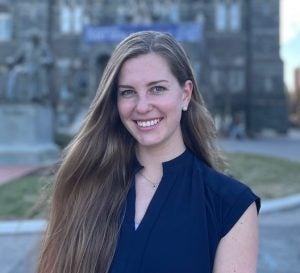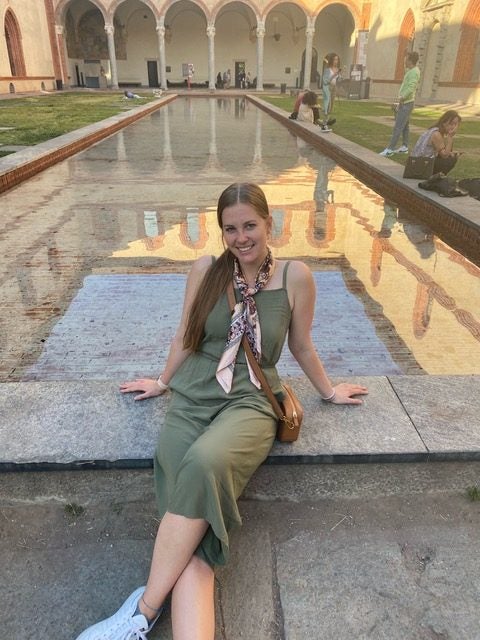
Sydnee Wilke is originally from North Carolina. She graduated from the Ohio State University in 2020 with a BA in International Studies and Russian. Throughout 2021-2022, she was an intern at Freedom House and USAID’s Office of Transition Initiatives. In addition to MAERES, she is pursuing a certificate in Global Human Development.
In this interview, Sydnee shares her unique experience working as a Fulbright English Teaching Assistant in Italy during the 2021 to 2022 academic year.
Last academic year, you were a Fulbright English Teaching Assistant (ETA) in Italy. What motivated you to apply to the Fulbright grant program?
As an undergraduate student at Ohio State University, I had always heard people applying for Fulbright in different countries. When it was my senior year, I knew I wanted to pursue my language studies in Russian before jumping into a Master’s Program. Thus, Fulbright appeared as an option. I originally applied for Fulbright Russia and was granted status as a finalist for Fulbright Russia. With the pandemic, that did not happen.
So you got into Fulbright Russia but ended up in Italy. How?
Last summer, people from Fulbright contacted me saying that I was not going to Russia as the program was canceled, but I could put my name on the list if I still wanted to go to another country. I put my name down and was contacted by Fulbright Italy. They had some open positions for me. Although I had been to Italy before, I don’t speak Italian and didn’t know a lot about the country other than the major cities. So I said, “Sure, I will go and learn about the new place and new language.”

What can you tell us about this experience? What did you do as a Fulbright English Teaching Assistant?
I was an English Teaching Assistant in a high school in Sardinia. I taught eight different classes. My classes were in a technical high school: the school’s main focus of study was electronics and chemistry. I worked every day, teaching students different things about American culture and essential slang words – things they may not get in a regular structured English class. Outside of school, I participated in a group called International Tuesday, where I met up with different people from around the world who just happened to be in Sardinia. We would speak different languages and get to know each other and our cultures.
How unique was that year’s Fulbright ETA?
This ETA experience was quite unique because of the pandemic. Fulbright Italy took 20 teaching assistants this year due to the backlog of not going because of COVID-19 last year. In a normal situation, it was supposed to be ten of us. There were nine of us on the island of Sardinia, but I was alone in my town.
I was the only ETA not partnered up with another teacher. It was challenging, but luckily I worked with great English teachers at my school. I did two out of three of their classes for the week, and they welcomed flexibility with the class structures and materials from my side.
What do you think were the main challenges?
Before going to Italy, I decided to complete an entire Italian Duolingo course. However, with Duolingo, you don’t speak but just learn words, phrases, and grammar. While there, I realized that English is not a very commonly spoken language in Sardinia. When I went to the immigration office, for example, none of the immigration officers spoke English. They had one person in the office who spoke English and had to pull him away from his current job to help me. All the paperwork was in Italian. I had to figure it out. The primary way I learned Italian was by listening and reading.
I think Italian is a lot easier than Russian. Having learned Russian grammar, it was easier to pick up Italian grammar. It was not as challenging, at least. So I learned Italian and could communicate in all daily life settings and with my students that way.
How do you think this experience can help your future life and career goals?
One day, I would like to be a Foreign Service Officer with the State Department. This was a unique experience because, as a Foreign Service Officer, you don’t always get to go where you want to go. You have to adapt to a new country and a new culture. This experience was a great example of me having to learn how to navigate in a country I knew nothing about.
I also think it’s an excellent opportunity to get a chance to spend a year abroad and immerse yourself in a new place and learn their history, culture and food, and some of their traditions.
What advice would you give your fellow graduate students who want to apply to the program?
There are two main pieces of advice. First, identify the country you want to go to and make sure you have a solid argument for that country. When applying for Fullbright, I chose Russia because I had the most experience with my internships, language studies, and undergraduate major, making me a good candidate for Russia. Knowing where you would be best and where you have the highest chance of being accepted is excellent advice.
The second piece of of advice is to reach out for help from your university, family, friends, professors and people you know who’ve done Fullbright. I am always willing to help people if they want to ask questions. I had some informational meetings with future applicants looking to apply for Fulbright Italy and Fulbright Russia.
What will you be doing this academic year?
I will be in Riga, Latvia, this academic year, doing a Boren Fellowship. I will study the Russian language in Riga for eight months and hope to immerse myself in the language and take the chance to be in one of the countries that I focus my master’s degree on.